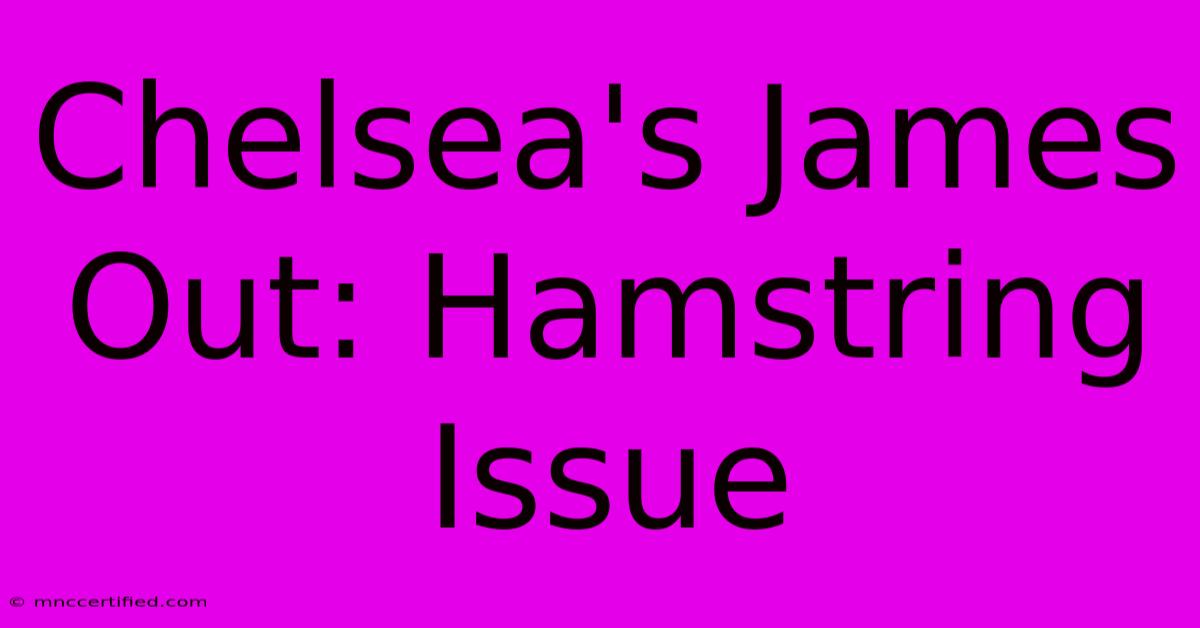Chelsea's James Out: Hamstring Issue

Table of Contents
Chelsea's James Out: Hamstring Issue Throws Wrench in Potter's Plans
Reece James's latest hamstring injury has sent shockwaves through Chelsea and left manager Graham Potter facing a significant defensive headache. The news, confirmed by the club, casts a long shadow over the Blues' upcoming fixtures and raises concerns about the long-term fitness of their star right-back. This article delves into the implications of James's injury, exploring its potential impact on Chelsea's season and examining the options Potter now has to fill the void.
The Severity of the Hamstring Injury: A Deeper Dive
While the club hasn't released specifics on the severity of the hamstring issue, reports suggest it could keep James sidelined for several weeks. This is a devastating blow for both the player and the team. Hamstring injuries, notorious for their recurrence, often require careful management and rehabilitation to prevent further setbacks. The length of his absence will depend heavily on the grade of the tear and his individual response to treatment. This uncertainty is a major concern for Potter, who is already juggling a demanding schedule and a squad hampered by injuries.
The Impact on Chelsea's Season
James's absence leaves a gaping hole in Chelsea's defense. His attacking prowess from right-back is unmatched in the squad, and his defensive contributions are equally vital. Losing him significantly weakens both aspects of their game. Chelsea's upcoming fixtures, including crucial Premier League matches and potential Champions League encounters, will be significantly more challenging without his presence. The team's ability to maintain their current form and compete for trophies will be severely tested. The lack of a truly reliable backup adds to the pressure, forcing Potter to make difficult tactical decisions.
Potter's Options: Navigating the Defensive Crisis
With James ruled out, Potter faces a crucial decision: who will fill the void at right-back? Several options exist, each with its own strengths and weaknesses:
-
Trevoh Chalobah: A versatile defender, Chalobah could potentially fill in, but he's arguably more comfortable in a central defensive role. Using him at right-back might disrupt the balance of the backline.
-
Cesar Azpilicueta: The experienced captain is a possibility, but at 33, his pace might be a limiting factor against faster wingers. His leadership qualities remain invaluable, however.
-
Wesley Fofana: While primarily a centre-back, Fofana possesses the athleticism to potentially adapt to the right-back position. This remains a high-risk, high-reward option.
The choice Potter makes will be crucial, impacting Chelsea’s defensive solidity and attacking fluidity. Each option presents trade-offs, and the manager must weigh the pros and cons carefully.
The Long-Term Implications and Prevention
James's recurring hamstring problems raise serious concerns about his long-term fitness. Chelsea's medical staff needs to thoroughly investigate the root cause of these injuries to implement preventative measures. This might involve a review of his training regime, injury prevention strategies, and possibly even adjustments to his playing style. Preventing future hamstring injuries for James is crucial not just for Chelsea's immediate success, but also for his long-term career. The club must invest in proactive measures to safeguard their star player's future.
Conclusion: A Difficult Situation for Chelsea
Reece James's injury is a significant setback for Chelsea. The absence of their star right-back creates a significant challenge for Graham Potter, forcing him to adapt his tactics and rely on alternative solutions. The club's response, both in terms of immediate tactical adjustments and long-term injury prevention, will be critical in determining their success in the remaining games of the season. The focus now shifts to navigating this difficult period and ensuring the team maintains its competitive edge.

Thank you for visiting our website wich cover about Chelsea's James Out: Hamstring Issue. We hope the information provided has been useful to you. Feel free to contact us if you have any questions or need further assistance. See you next time and dont miss to bookmark.
Featured Posts
-
Codependency And Trauma Bonding
Nov 23, 2024
-
Wayne Rooney Cheating Coleens Response
Nov 23, 2024
-
Thanksgiving Holiday Forecast Early Look
Nov 23, 2024
-
Buy Coldplay Uk Tour Tickets Now
Nov 23, 2024
-
How Much Are 100 Bitcoins Worth
Nov 23, 2024